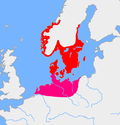Latin characters. Proto-Indo-European verbs reflect a complex system of morphology, more complicated than the substantive, with verbs categorized according...
82 KB (7,772 words) - 15:18, 23 August 2024
characters used to write reconstructed Proto-Indo-European words (for an explanation of the notation, see Proto-Indo-European phonology). Without proper rendering...
63 KB (5,751 words) - 09:25, 16 November 2024
Proto-Indo-Iranian, also called Proto-Indo-Iranic or Proto-Aryan, is the reconstructed proto-language of the Indo-Iranian branch of Indo-European. Its...
38 KB (1,587 words) - 20:02, 16 November 2024
characters used to write reconstructed Proto-Indo-European words (for an explanation of the notation, see Proto-Indo-European phonology). Without proper rendering...
17 KB (1,981 words) - 09:30, 10 October 2024
most verbs fall into one of these categories. Suppletive verbs are completely irregular, being composed of parts of more than one Indo-European verb. There...
29 KB (2,932 words) - 18:29, 22 October 2024
characters used to write reconstructed Proto-Indo-European words (for an explanation of the notation, see Proto-Indo-European phonology). Without proper rendering...
66 KB (5,278 words) - 23:33, 21 November 2024
characters used to write reconstructed Proto-Indo-European words (for an explanation of the notation, see Proto-Indo-European phonology). Without proper rendering...
104 KB (4,006 words) - 01:05, 23 October 2024
characters used to write reconstructed Proto-Indo-European words (for an explanation of the notation, see Proto-Indo-European phonology). Without proper rendering...
24 KB (2,859 words) - 18:10, 11 August 2024
Proto-Indo-European society is the reconstructed culture of Proto-Indo-Europeans, the ancient speakers of the Proto-Indo-European language, ancestor of...
78 KB (9,373 words) - 07:05, 21 October 2024
The Proto-Indo-Europeans are a hypothetical prehistoric ethnolinguistic group of Eurasia who spoke Proto-Indo-European (PIE), the reconstructed common...
54 KB (6,411 words) - 09:32, 18 September 2024
characters used to write reconstructed Proto-Indo-European words (for an explanation of the notation, see Proto-Indo-European phonology). Without proper rendering...
49 KB (6,272 words) - 13:01, 6 September 2024
characters used to write reconstructed Proto-Indo-European words (for an explanation of the notation, see Proto-Indo-European phonology). Without proper rendering...
141 KB (17,177 words) - 13:17, 12 November 2024
parent Proto-Indo-European, one for the active voice and another for the middle voice. Verbs can be conjugated in either voice, although some verbs only...
55 KB (4,728 words) - 10:55, 26 October 2024
characters used to write reconstructed Proto-Indo-European words (for an explanation of the notation, see Proto-Indo-European phonology). Without proper rendering...
28 KB (3,501 words) - 07:55, 20 August 2024
Proto-Celtic, or Common Celtic, is the hypothetical ancestral proto-language of all known Celtic languages, and a descendant of Proto-Indo-European. It...
84 KB (5,188 words) - 18:46, 25 November 2024
Indo-European verbal prefix used in Indo-Iranian, Greek, Phrygian, Armenian, and Albanian, to indicate past time. The augment might be either a Proto-Indo-European...
9 KB (862 words) - 23:00, 29 August 2024
some degree through the comparative method. Proto-Italic descended from the earlier Proto-Indo-European language. Although an equation between archeological...
85 KB (4,538 words) - 07:49, 21 September 2024
from the Proto-Indo-European perfect. One explanation is that Anatolian turned the perfect into a present tense for a certain group of verbs while another...
10 KB (1,270 words) - 07:46, 21 September 2024
The Proto-Indo-European homeland was the prehistoric linguistic homeland of the Proto-Indo-European language (PIE). From this region, its speakers migrated...
119 KB (14,055 words) - 04:49, 20 November 2024
Messapic and Armenian. Verbs in Early Proto-Albanian (Early PA) and contemporary Albanian are divided into thematic verbs and athematic verbs, thus following...
127 KB (11,428 words) - 20:35, 21 November 2024
Proto-Balto-Slavic (PBS or PBSl) is a reconstructed hypothetical proto-language descending from Proto-Indo-European (PIE). From Proto-Balto-Slavic, the...
100 KB (11,146 words) - 22:19, 9 November 2024
characters used to write reconstructed Proto-Indo-European words (for an explanation of the notation, see Proto-Indo-European phonology). Without proper rendering...
47 KB (5,284 words) - 23:27, 5 September 2024
had a SOV word order. Proto-Baltic is said to have possessed certain unique traits, such as turning short Proto-Indo-European vowels *o, *a into *a,...
100 KB (6,679 words) - 12:16, 22 October 2024
characters used to write reconstructed Proto-Indo-European words (for an explanation of the notation, see Proto-Indo-European phonology). Without proper rendering...
130 KB (12,194 words) - 16:22, 22 November 2024
The Proto-Greek language (also known as Proto-Hellenic) is the Indo-European language which was the last common ancestor of all varieties of Greek, including...
70 KB (6,787 words) - 03:56, 16 November 2024
Proto-Indo-Aryan (sometimes Proto-Indic) is the reconstructed proto-language of the Indo-Aryan languages. It is intended to reconstruct the language of...
8 KB (661 words) - 13:52, 2 September 2024
hypothetical proto-language from which all of these languages are descended, a language dubbed Proto-Indo-European (PIE), and its speakers, the Proto-Indo-Europeans...
41 KB (3,965 words) - 15:41, 21 October 2024
A Proto-Indo-European (PIE) root word may be: Proto-Indo-European root noun Root aspect (root present and root aorist) in a Proto-Indo-European verb Proto-Indo-European...
300 bytes (71 words) - 19:02, 23 July 2022
the verb's root vowel (as in English I rise~I rose). Whereas the strong verbs are the oldest group of verbs in Germanic, originating in Indo-European, the...
60 KB (5,115 words) - 22:38, 29 June 2024
The following is a table of many of the most fundamental Proto-Indo-European language (PIE) words and roots, with their cognates in all of the major families...
341 KB (8,992 words) - 19:30, 21 November 2024





